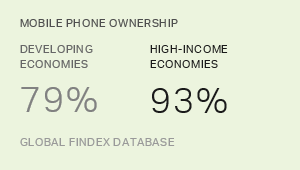American consumers received a major psychological shock nearly a month ago when the Treasury announced the need for a federal bailout of the U.S. banking system. Prior to that announcement, it seems many on Wall Street, as well as on main street, believed the nation's financial crisis could be "contained" and the overall economy insulated -- at least to a large extent -- from its effects.
The battle over passage of the legislation, including the inability to get House approval on the first attempt, simply added to the consumer shock. Since then, the global financial crisis has unfolded and countries around the world have acted to shore up their banking systems and reassure their savers and depositors that their money is safe in the world's largest financial institutions.
Gallup's recent polling suggests that, despite the recent highly negative report on consumer sentiment, the Treasury and Federal Reserve Board of Governors' historic efforts to support the U.S. financial system may have had, at least, .
However, while rebuilding confidence in the U.S. financial system is essential and will require more time, it is not likely to be sufficient enough to reinvigorate the underlying economy. The sharp drop in September retail sales and the continuing deterioration in housing activity suggest that the economy was heading into a recession prior to the most recent financial crisis shock. And, suggests that this holiday sales season could be worse for the nation's retailers than the season following the 1990-91 recession.
Still, even this grim assessment does not take into account the damage done to the average American's financial wellbeing. Recent ÆéûÜǨû§polling shows two-thirds of Americans feel they have been hurt by the recent financial chaos, and . In turn, this feeling of financial loss combined with the recent credit freeze, increasing unemployment, and the general consumer fear associated with the financial crisis, could produce an even deeper recession than the one implied by Gallup's early Christmas sales estimates.
On the other hand, gas prices at the pump have been declining. And, over time, the efforts of the federal government should begin to thaw the credit markets and make consumer credit somewhat easier to obtain. Hopefully, these positive trends should help to mitigate -- at least to some degree -- the severity of the full-fledged recession as it rolls out.
And maybe most importantly, there is new national leadership on the way in two weeks, no matter who is elected. Right now, 80% of Americans do not believe that President Bush and his economic team can provide the leadership necessary to successfully address the nation's economic problems. The new president will have an important opportunity to exert much needed new economic leadership when he takes office and could play a critical role in building the consumer confidence necessary for an economic recovery next year. -- Dennis Jacobe, Chief Economist
Previous Posts
October 4, 2008
The drop of the Dow Jones Industrial Average by more than 150 points on Friday, Oct. 3, reflects how Wall Street's attention immediately turned back to the basics of the economy following passage of the important new $700 billion bailout legislation. In turn, the message to Main Street may be that, despite what the politicians might have said during the debate over the rescue plan, it is not a "silver bullet" that will reignite the U. S. economy.
At best, the bill the president just signed is designed to be something of a "tourniquet" for the credit markets. The idea is to stop the "bleeding" -- keep more financial institutions from collapsing -- free up what appear to be frozen credit markets, and restore confidence in the U.S. banking system. Because credit is the lifeblood of the U.S. economy, this is essential to prevent the recession from becoming even longer and more severe.
Gallup's recent polling, as detailed in the tabs linked to this page, suggests that Americans needed to be reassured about the fundamental soundness of the U.S. financial system. In sharp contrast to the recent Conference Board report suggesting a September uptick in consumer confidence, ÆéûÜǨû§polling shows -- exactly coincident with the latest financial crisis.
Additionally, with the failure of two of the nation's largest banks, it is crucial to monitor Americans' confidence in financial institutions. The percentage of Americans saying they have "a great deal" or "quite a lot" of confidence in U.S. banks already had fallen to 32% even before the collapse of Wachovia and Washington Mutual. Even more significantly, ÆéûÜǨû§polling finds affluent consumers are showing significantly less confidence in the U.S. banking system as each week passes and the banking sector continues to deteriorate.
Passage of this new legislation in general, and the in particular, should help restore U.S. consumer, investor, and business confidence to some degree. However, this legislative effort is not designed to address the basic problems currently facing the U.S. economy, including jobs and consumer spending.
As ÆéûÜǨû§predicted, The Bureau of Labor Statistics reported that . And now, the U.S. economy faces a crisis-of-confidence induced spending pull back on the part of consumers and businesses .
In the days ahead, the Federal Reserve Board and monetary authorities around the world are likely to lower interest rates in an effort to try and soften the depth of the unfolding global recession. And, the political candidates will likely put forth new proposals to stimulate the U.S. economy. Of course, the candidate who does the best job of convincing Americans that he has a plan that will not only restore public confidence, but also get the economy moving in the right direction once more, is likely to have the inside track this November.
We at ÆéûÜǨû§are keeping a daily pulse on Americans' views on the economy and their personal finances. For the most recent and relevant data on Americans thoughts, feelings, and reactions to the state of the U.S. economy, visit this page often. You can also to get the latest business news from ÆéûÜǨû§delivered to your inbox. -- Dennis Jacobe, Chief Economist
